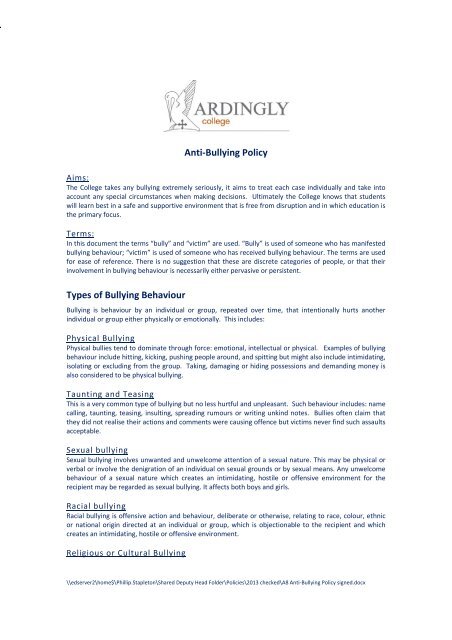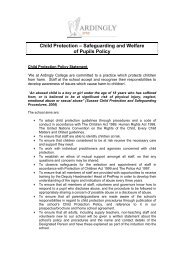Anti-Bullying Policy Types of Bullying Behaviour - Ardingly College
Anti-Bullying Policy Types of Bullying Behaviour - Ardingly College
Anti-Bullying Policy Types of Bullying Behaviour - Ardingly College
You also want an ePaper? Increase the reach of your titles
YUMPU automatically turns print PDFs into web optimized ePapers that Google loves.
The <strong>College</strong> recognises that bullying can occur: from staff to staff, from staff to student, from student tostaff, and from student to student. While the <strong>College</strong> considers all forms <strong>of</strong> bullying unacceptable, thisdocument focuses only on the last category.School Code on <strong>Bullying</strong>:All reasonable steps should be taken to ensure that, so far as it is possible, every student feels safe andhappy at School and feels supported and protected at all times.The <strong>College</strong> expects all members <strong>of</strong> the <strong>College</strong> Community to uphold the School Code on <strong>Bullying</strong> whichis expressed in the <strong>Behaviour</strong> and Conduct <strong>Policy</strong> and reiterated here:• Every student at <strong>Ardingly</strong> has the right to enjoy his or her learning and leisure time free fromintimidation.• Our <strong>College</strong> Community will not tolerate unkind actions or remarks, even when these were notintended to hurt.• To stand by, when someone else is being bullied, is to support bullying.• If you are being bullied, or you know <strong>of</strong> someone who is being bullied you should report this to amember <strong>of</strong> staff or a responsible senior student.• <strong>Bullying</strong> will always be taken seriously.Ways <strong>of</strong> Preventing or Reducing The Incidence <strong>of</strong> <strong>Bullying</strong>:• An open, positive, caring and trusting atmosphere is nurtured in the <strong>College</strong>.• Staff are expected to educate without prejudice or discrimination; this is achieved by:o Training: INSET and inductiono understanding <strong>College</strong> principles, policies and responsibilitieso celebrating achievemento providing support – tutors, HoMMs, Medical Centre, peer support, Chaplain, counsellor,independent listenero anticipating problemso disciplining sensibly and fairly, taking those with special educational needs intoconsiderationo making opportunities to listen to studentso acting as advocates <strong>of</strong> studentso educating students effectively through tutorial work and Eudaimoniao encouraging, rewarding and promoting good behaviouro close and effective tutoring system.• Students are encouraged to feel able to share problems with staff:o to turn to anyone they trust, if they have a problemo not to feel guilty about airing complaints• Meals are pleasant social occasions. Situations where bullying is likely to occur are monitoredclosely. In particular, the member <strong>of</strong> staff on day duty shall patrol the Tuck Shop area at breakand close supervision <strong>of</strong> the lunch queue will be maintained by staff.• Equal opportunities practices are observed in <strong>College</strong> and Houses:o discriminatory words and behaviour are treated as unacceptableo positive attitudes are fostered towards people who are disabled and towards ethnic,cultural and linguistic groups within and outside the <strong>College</strong>o positive attitudes are fostered towards both sexes through the curriculum and tutorials\\edserver2\home$\Phillip.Stapleton\Shared Deputy Head Folder\Policies\2013 checked\A8 <strong>Anti</strong>‐<strong>Bullying</strong> <strong>Policy</strong> signed.docx
• A course on bullying forms part <strong>of</strong> the Shell Eudaimonia curriculum. This includes debate on:o Who is the “bully”? Who is the “victim”?o Why are some “bullies” and others “victims”?o What should a student do if he is bullied?o What constitutes bullying? Where are boundaries?o Who do I go to if I am being bullied?• Appropriate training in all aspects <strong>of</strong> care is arranged, to ensure that Housemasters andHousemistresses and other staff have the necessary pr<strong>of</strong>essional skills, especially:o the risk and indications <strong>of</strong> child abuse and bullying, and how to deal with caseso counselling skills (including bereavement).• In Houses:o there is an adequate presence <strong>of</strong> staffo staff are actively involved with students and in all areas <strong>of</strong> the House when they are ondutyo attempts are made to avoid boredom and lack <strong>of</strong> purpose among studentso there is space available for students’ quiet withdrawal• All senior students have the opportunity for House duties.• The responsibilities <strong>of</strong> senior students are appropriately limited.• Staff realise the pastoral role <strong>of</strong> Prefects and senior students, and <strong>of</strong>fer appropriate support.• House and <strong>College</strong> Prefects are trained at the beginning <strong>of</strong> the academic year or as part <strong>of</strong> theprefects’ training at the end <strong>of</strong> the Lower Sixth, so that they control younger students sensitively,especially in giving punishments.• Older students are encouraged to keep an eye on younger students, <strong>of</strong>fering support whereneeded.Monitoring Students’ <strong>Behaviour</strong>, Including <strong>Bullying</strong>• Members <strong>of</strong> staff are vigilant at all times, but particularly outside rooms before and betweenlessons, and in the Dining Hall.• Housemasters and Housemistresses, Tutors, House staff and senior students are alert to thepossibility <strong>of</strong> bullying in Houses, particularly in study bedrooms and common areas.• Meetings <strong>of</strong> Housemasters Housemistresses and House Prefects regularly discuss bullying withinthe House.• Tutors regularly discuss relationships, including bullying, with their tutees.• There is close cooperation between <strong>College</strong> and House staff:o Housemasters and Housemistresses are informed <strong>of</strong> issues and incidents in theclassroom and the wider school, and are informed <strong>of</strong> relevant bullying incidents as soonas possibleo Housemasters and Housemistresses report to other staff in the <strong>College</strong> issues andincidents involving individual studentso there is effective and close liaison between medical and House staff and <strong>College</strong> staff.• Record‐keeping on the welfare and development <strong>of</strong> individual students:o is efficient and well‐maintainedo is sensitive to individual changeso includes all relevant information to provide staff with information about welfare at alltimeso enables staff to spot changes in the well‐being <strong>of</strong> individuals in time to take appropriateaction.• House and <strong>College</strong> Prefects are monitored to ensure that their responsibility is properlyexercised. A Student Welfare Questionnaire is used to gauge student feeling.\\edserver2\home$\Phillip.Stapleton\Shared Deputy Head Folder\Policies\2013 checked\A8 <strong>Anti</strong>‐<strong>Bullying</strong> <strong>Policy</strong> signed.docx
• Houses have an Incident Book for noting significant events which need to be monitored andknown to other members <strong>of</strong> the House staff team. Housemasters must keep Incident Books up todate and file termly incident reports.• Housemasters and Housemistresses regularly communicate with the Tutors <strong>of</strong> students in theirHouse and monitor their Tutor records.• The Deputy Head monitors Incident reports and discipline records regularly.Procedures to deal with alleged incidents <strong>of</strong> <strong>Bullying</strong>• Any student being bullied or knowing that someone is being bullied should report what ishappening to his or her parents or guardians or to someone in authority within the <strong>College</strong>, inaccordance with the School Code on <strong>Bullying</strong>. The following are available:o Housemaster or Housemistress, tutor or any other teachero House Matron or cleanero A <strong>College</strong> prefect, House prefect or a senior studento The Chaplaino A Counsellor (contactable through the Medical Centre) or the Independent Listener (FrJohn Crutchley Tel No 01444 892332)o A School Doctor or a Sister in the Medical Centreo The Headmastero The Child Protection Officer (Deputy Headmaster)o The Deputy Child Protection Officer (Senior Mistress)o A member <strong>of</strong> the Senior Management TeamThey may also wish to contact:o Social Services: 01243 771000o Children’s Rights Director contact: Freephone 0800 528 0731o ChildLine: 0800 1111• A victim or a witness <strong>of</strong> bullying may be uncertain about taking this step, for a variety <strong>of</strong> reasons:o he or she does not want to tell taleso he or she does not want the bully to be punishedo he or she is afraid <strong>of</strong> what the bully will doo he or she has become demoralised and feels that he or she does not deserve any better• There should be an atmosphere within the <strong>College</strong> which encourages students to be completelyopen regarding bullying. Moreover, students should be encouraged to realise that it is alwaysbetter to tell someone, because:o sharing what is happening will help the victim to deal with his feelingso bullying thrives on secrecy – it is best dealt with by being brought into the open• it may save other people from becoming victims <strong>of</strong> the same bully• Any person in authority who learns <strong>of</strong> alleged bullying behaviour should:• firstly, <strong>of</strong>fer advice and support to the alleged victim• report the allegation to the Housemaster(s)/Housemistress(es) <strong>of</strong> the students involved (ie bothvictim and bully) as soon as possible.• Housemasters/Housemistresses will record this and, if they consider it appropriate, interviewboth the alleged victim and bully and any possible witnesses from their House. These interviewswill be recorded together with action taken in the case as a whole.• It is essential that Housemasters and Housemistresses <strong>of</strong> both the victim and the bully continueto monitor the situation regularly. If the victim and the bully are from different Houses, therelevant Housemasters and Housemistresses should discuss their findings regularly during thefirst few weeks after an alleged incident, until they are satisfied that further incidents areunlikely. They should record their results.• Housemasters and Housemistresses must notify the Deputy Headmaster <strong>of</strong> all alleged bullyingincidents.\\edserver2\home$\Phillip.Stapleton\Shared Deputy Head Folder\Policies\2013 checked\A8 <strong>Anti</strong>‐<strong>Bullying</strong> <strong>Policy</strong> signed.docx
• Housemasters and Housemistresses will be in contact with parents <strong>of</strong> both the victim and thebully about the case and any action taken.• Housemasters and Housemistresses should consider sharing information with some or allcolleagues, especially the Tutors <strong>of</strong> the students concerned, and with students in the House, inorder that they may be alert to the need to monitor certain students closely.• The welfare <strong>of</strong> the victim should be considered <strong>of</strong> paramount importance. The student should beinformed <strong>of</strong> any actions taken. They might need help to deal with their feelings and tounderstand and overcome their vulnerability.• The bully should be given help and support in trying to change their behaviour.• If the Housemaster or Housemistress believes that bullying has occurred or is occurring involvinga student in their House or that bullying behaviour has occurred after warnings have been givento the bully, or a student has made a formal complaint and they consider that the matter cannotbe dealt with internally, they may ask the Deputy Headmaster (or another member <strong>of</strong> staff whenit is deemed more appropriate) to conduct interviews within the guidelines set out below. TheHeadmaster will be informed.What to do if you are being bullied?If you are being bullied, there a range <strong>of</strong> strategies you can adopt to deal with the situation :• Always remember that no one deserves to be bullied ‐ bullying is always the bully’s fault. Bulliesseek out and need victims and just happened to pick you.• Tell a friend what is happening. Ask him/her to help you. It will be harder for the bully to pick onyou if you have a friend with you for support.• Ignore the bully or say ‘No’ really firmly, then turn and walk away. Don’t worry if people thinkyou’re running away. Remember, it is very hard for the bully to go on bullying someone whowon’t stand still to listen.• Don’t show that you are upset or angry. Bullies love to get a reaction. Keep calm and hide youremotions; the bully might get bored and leave you alone.• Make up funny or clever replies in advance. Replies don’t have to be brilliant, but it helps to havean answer ready. Practice saying them at home.• Don’t fight back if you can help it. If you fight back, you could make the situation worse, get hurtor be blamed for starting the trouble.• Stick with a group, even if they are not your friends. Bullies tend to pick on people when they areon their own.• Practise ‘walking tall’ – look in a mirror. If you look positive and confident, the bully will find itharder to identify you as a target – even if you don’t feel that way inside.• Keep a diary about what is happening. Write down details <strong>of</strong> incidents and your feelings. Whenyou decide to tell someone, a written record <strong>of</strong> the bullying makes it easier to prove what hasbeen going on.• Tell your parents or other adults such as your tutor or HoMM ‐ you need their help. Don’t sufferin silence and let the bullies win.• Don’t answer texts, emails or messages which are abusive. Log them and report them to yourparents or a teacher, for example your Tutor or HoMM. Don’t delete them. You don’t have toread them but you should keep them as evidence. Do not give out personal details on theinternet or by text. If you use chat‐rooms, always stay in the public areas.• Don’t answer texts, emails or messages from someone you don’t know.• Speak to prefects, both House and School.• Speak to the Chaplain (01444 893006 or 892656)\\edserver2\home$\Phillip.Stapleton\Shared Deputy Head Folder\Policies\2013 checked\A8 <strong>Anti</strong>‐<strong>Bullying</strong> <strong>Policy</strong> signed.docx
SanctionsAny sanction should be effective in stopping the bullying behaviour.If action is taken quickly it might be that a warning will suffice. In many cases where it is felt that bullyinghas taken place, the action in the first instance may not be disciplinary. It may sometimes be the case thatthe bully genuinely has not recognised the distress caused to the victim by his or her behaviour.Students are informed that bullying will not be tolerated in the <strong>College</strong> and that it is a disciplinary <strong>of</strong>fence.All <strong>of</strong> the school sanctions (as are listed in the Student Handbook) may apply and ultimately a student maybe excluded. It is likely that a serious bullying incident or an incident which is itself minor but forms part<strong>of</strong> a cycle <strong>of</strong> such incidents will, as a first step, result in external suspension.However, if the student responsible for the bullying behaviour repeats it, sanctions are likely to beapplied. Ultimately, a bully who does not change his or her behaviour may have to leave the <strong>College</strong>.A bullying incident might be treated as a Child Protection concern when there is reasonable cause tosuspect that a child is or is likely to suffer significant harm.If you have been bullied:If you are persistently bullied, you might start to believe what the bully says – you are ugly and awful andthat no one will ever like you. This is not true: this is ‘victim‐think’. To help you start feeling better aboutyourself:• Try doing some mental exercises to build up your self‐confidence, for example, focussing on yourbreathing to calm the mind• Make a list <strong>of</strong> all the good things you can think <strong>of</strong> about yourself. We all have talents. The nexttime you feel down, think about the good things on your list• Learn to talk to yourself in a positive way• If you have a particular interest, develop your skills, whatever they are• Change your mobile phone number.• Introspection is important – reflect on how you might move forwardHelpful approaches:Saying no• When you say NO, say it firmly• Listen to your body and to your feelings: What do you really want to say?• Try not to get caught up in arguments• If you don’t want to do something, don’t give in to pressure. Be firm. Remember, we have theright to say NO!• When you say No to someone, you are only refusing the request. You are not rejecting theperson.‘Broken record’• Stay calm and focussed• Repeat over and over the same phrase (such as ‘No’ or ‘I’m not interested’)• Make your phrase short and precise (‘it’s my pencil’ or ‘Go away’)Fogging\\edserver2\home$\Phillip.Stapleton\Shared Deputy Head Folder\Policies\2013 checked\A8 <strong>Anti</strong>‐<strong>Bullying</strong> <strong>Policy</strong> signed.docx
• Imagine that you are inside a huge, white fog‐bank: the insults are swallowed up by the fog longbefore they reach you. Nothing touches you.• Reply to taunts with something short and bland: “That’s what you think.” “Maybe.” Then walkaway.• Practise by thinking <strong>of</strong> the worst things the bully says to you and pretend that you are inside yourfog bank – nothing reaches you.Phone calls• If you get an abusive or silent phone call, don’t hang up immediately. Instead, put the phonedown and walk away for a few minutes. Then hang up or turn your phone <strong>of</strong>f. Once the bullyrealises they can’t get you rattled, they usually get bored and stop bothering you. Always tellsomeone else.• Use your voicemail to vet your calls.• Remember that almost all calls can be traced.• Get help from your network provider.Emails• Never reply to unpleasant emails. The sender wants a response – don’t give them thatsatisfaction.• Keep emails as evidence and tell an adult.• Never reply to someone you don’t know, even if there is an option to ‘unsubscribe’. This simplyconfirms that your email address is a real one.• Ask an adult to contact the sender’s internet service provider by writing abuse@ then the host,eg abuse@hotmail.comTake Your Time• Once the bullying stops, many former victims say that they don’t feel brilliant immediately. Ittakes time to get over bullying – you will feel better eventually.Further Information and related documents:www.bullying.co.uk throws a lifeline to despairing parents whose children are being bullied and whodon't know what to do. Contains advice for both children being bullied and their parents.www.kidscape.org.uk has lots <strong>of</strong> leaflets, booklets and help for parents <strong>of</strong> children suffering bullying. Theycan also train teachers, children and parents' groups in dealing with or preventing bullying.www.childline.org.uk is the UK's free national helpline for children and young people in trouble or dangerwho can call free 24 hours a day on Telephone 0800 1111.Reviewed: June 2013Next Review: September 2014Monitored by: Deputy Headmaster, Pastoral CommitteeSigned:HeadmasterSigned:Chairman <strong>of</strong> School Council\\edserver2\home$\Phillip.Stapleton\Shared Deputy Head Folder\Policies\2013 checked\A8 <strong>Anti</strong>‐<strong>Bullying</strong> <strong>Policy</strong> signed.docx
















